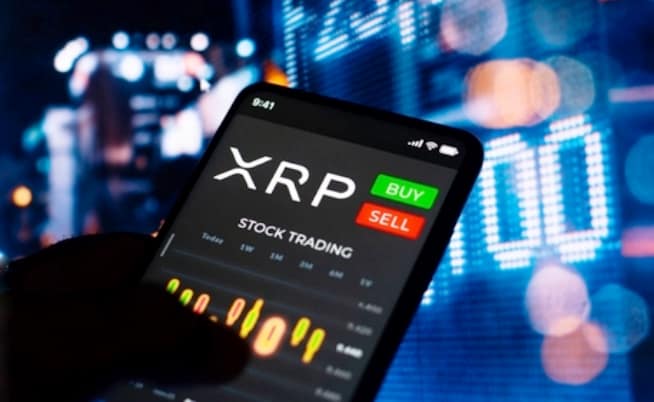
Ripple (XRP) is a popular cryptocurrency with several advantages compared to Bitcoin and other cryptocurrencies. We discussed this when explaining what XRP is. Now, let’s learn how to use XRP safely. In this guide, we will discuss the top XRP wallets.
What is XRP Wallet?
Choosing the right crypto wallet becomes essential when buying any cryptocurrency. Let’s learn how to keep your XRP coins safe.
An XRP wallet is a tool that lets you transfer and store XRP tokens. The best XRP wallet is the one that makes operations easy, fast, and secure. The XRP wallet, like other cryptocurrency wallets, has two sets of keys. There are two types of keys: private and public. The private key is used to send XRP to other wallets, while the public key is the address of your wallet that allows others to send you XRP tokens.
Note: Please note that private keys manage and represent your crypto tokens. To prove ownership of the tokens, you’ll need this private key. You will lose these tokens if you lose or someone steals your private key.
You can store this private key with a wallet provider (custodial wallet) or directly with the crypto (non-custodial wallet) wallet.
Custodial wallets are crypto wallets with a provider managing the user’s private key.
Non-custodial wallets are crypto wallets that give users complete control over their private keys.
XRP Wallets’ Types
Here are the three types of XRP wallets:
1. Hardware Wallets
This wallet is a physical device that looks like a USB stick and is used to store crypto tokens. The device is the only place where private keys are stored. This wallet, known as “cold storage,” is not connected to the internet. XRP is a popular cryptocurrency with a high market value. Many hardware wallets can be used to store XRP.
Pros
1. The most secure type of wallet. Keeping private keys offline helps prevent hacks and malware exploits.
2. You can make hardware wallets even more secure by keeping them in a bank’s safety deposit box or with a notary.
Cons
1. Hardware wallets can be expensive, ranging from $50 to $150, whereas other wallets are typically free.
2. It is complex to use and has a lengthy and tedious setup process.
2. Desktop and Mobile Wallets (Software)
These wallets are software installed on a desktop device (Windows, Mac, Linux). They run as programs that require an internet connection to connect to the blockchain. Desktop wallets are cryptocurrency storage that keeps your cryptocurrencies and information on your computer. They are considered non-custodial because you have full control over your assets.
Mobile wallets are crypto wallets you can install and use on your iOS or Android smartphone. The most popular type of wallet is available in two forms: custodial and non-custodial.
PROs
1. Desktop wallets are usually user-friendly with easy-to-use interfaces, providing a great user experience.
2. Storing crypto assets on your local device provides better security, but hacks and exploits are still risky. You need antivirus software and a firewall!
3. You can use it anywhere and anytime if you have a web connection.
Cons
1. There is a risk of hacks and exploits from malware installed on your device or targeted attacks by hackers.
2. Smartphone theft or defects can pose a security risk and result in financial loss.
3. With so many mobile wallets available, it’s important to choose carefully due to the lack of essential security features in many of them.
3. Paper Wallets
Paper wallets are a simple way to store cryptocurrency information on paper. To use this wallet, you create a new one on a website and print the necessary information on paper. The person would keep the paper in a safe spot.
Pros
1. If the website is trusted, it offers a very high level of security.
Cons
1. Low physical durability can result in the loss of funds if exposed.
List Of 15 Best XRP Wallets
Now let’s talk about the wallets themselves, after discussing the different types.
Here are the top XRP wallets:
1. Ledger։ Hardware Wallet
The ledger wallet is an excellent choice if you want a secure way to store your XRP tokens. Ledger offers separate wallets for various cryptocurrencies. In most cases, you can use one wallet to store multiple tokens. To determine which is best, compare Ledger Nano and Ledger S Plus.
Ledger Features
1. USB-compatible device
2. The private keys are stored on the device
3. Supporting more than 5,500 coins and tokens
4. You can have a maximum of 100 applications on your Ledger.
5. 2-factor authentication
Price of Nano S Plus model: $79
Verdict: If you like hardware wallets, Ledger devices are among the best options. Remember, you need to pay for the device itself. The Nano S model is priced at $79, while the Nano X is priced at $149.
Prices may vary, so it’s best to visit Ledger’s official website for the most up-to-date information on prices and products.
2. Crypto.com: Software Wallet
Crypto.com Features
1. Crypto.com has a prepaid Visa card that works like a rewards debit card. It makes it simpler to use your cryptocurrency for spending.
2. Earn up to 14.5% annually on deposits of over 30 cryptocurrencies.
3. You can borrow up to 50% of your wallet balance for any cryptocurrency, including XRP.
Verdict: Crypto.com’s trading interface might be overwhelming if you’re new to cryptocurrency. Instead, you can try using a beginner-friendly platform such as Blocktrade.
3. Blocktrade։ Software Wallet
Blocktrade is a highly secure and affordable XRP wallet option. You can buy, sell, trade, and swap various tokens on this platform. You can also download the app for your phone.
Blocktrade is a platform that is perfect for beginners and is designed to be user-friendly. It is so simple that even people with basic computer skills can easily navigate it. Good news! There are no fees! Blocktrade is accessible on the web and on Android and iOS mobile devices. If you’ve traded stocks online, the experience is similar.
Blocktrade Features
1. The interface is designed to be very easy to understand, especially for beginners.
2. You can purchase the minimum amount of XRPs needed for just $10.
3. Available in over 120 countries.
4. No fees
4. Binance: Software Wallet
You can also use Binance as a popular XRP wallet. You can choose from various Binance wallets based on your preferences and needs. Two top XRP wallets are the Binance Web3 wallet and the Binance Chain Wallet.
Binance Features
1. Binance offers over 365 cryptocurrencies for trading, but only 65+ are accessible in the U.S.
2. There are three simple options for 24/7 customer support: submitting a ticket, chatting for basic questions, or contacting through Twitter.
3. Binance charges a simple 0.1% fee for spot trading.
Verdict: Binance is a secure and versatile platform for investing in and trading XRP. However, it may be overwhelming for beginners. It doesn’t have its crypto wallet, but it suggests using Trust Wallet.
5. Atomic Wallet: Software Wallet
Atomic Wallet is a wallet that can hold different cryptocurrencies, like XRP. It is decentralized.
This wallet is perfect for both new and existing XRP investors. It has a user-friendly interface and offers fast, secure, private, and anonymous portfolio management and transactions.
The wallet doesn’t create a new address for each transaction and doesn’t have coinjoin capability, but transactions are still anonymous. This wallet is great for those who want to stay anonymous.
Atomic Wallet Features
1. Atomic Wallet users have complete control over their private keys. These keys are typically encrypted and stored on their devices, allowing users to own their funds fully.
2. You can purchase XRP using bank cards.
3. Each operation has a 2% flat fee, with a minimum charge of $10.
6. Coinbase: Software Wallet
Coinbase is a popular cryptocurrency exchange that simplifies the process of buying, selling, and trading XRP coins. The trading fees could be reduced. The platform prioritizes customer safety by using top-notch security practices to protect deposits and assets.
Coinbase Wallet Features
1. It is one of the biggest cryptocurrency exchanges globally.
2. Users can schedule their XRP trading daily, weekly, or monthly.
3. You can use it to trade digital currencies and easily monitor them all in one location.
4. Coinbase keeps your funds in a secure vault for maximum safety.
7. Trezor: Hardware Wallet
The Trezor wallet is a popular choice for storing XRP, as it is a reliable hardware wallet.
Trezor’s hardware wallets are easy to use and provide a secure way to store XRP. The technical features and usability are excellent. The expensive devices can be a problem for beginners who want to try the crypto market but want to spend less on a wallet.
Trezor Features
1. Trezor uses strong cryptography standards to make transactions more secure.
2. It prioritizes wallet security.
3. The touchscreen display on Trezor’s Model T is the easiest to read among all hardware wallets.
4. The initial cost of a Model T was $217.
8. Metamask: Non-Custodial Software Wallet
MetaMask wallet is excellent for people familiar with cryptocurrency, but there may be better choices for beginners. If you need to know what to look out for, you could quickly lose your assets because the wallet can be targeted by malware and social engineering attacks.
Additionally, users who don’t have the 12-word secret seed phrase can permanently lose access to their crypto assets. New users should learn about cryptocurrency wallets before using MetaMask.
Metamask Features
1. To use MetaMask, users must download the software and create a wallet. No personal information like name, address, or Social Security number is required.
2. MetaMask prioritizes user anonymity over traditional security measures in its approach to security.
3. Users are responsible for paying gas fees to the blockchain for their transactions. The speed of processing depends on how fast the exchange needs to be. Users will be charged a service fee of 0.3% – 0.875% for swaps.
9. Xumm
XUMM is a mobile wallet that allows users to manage their non-custodial XRP Ledger accounts and tokens easily. It is kept safe with strong security features such as multi-sig and two-factor authentication.
XUMM is a platform that lets users easily manage and use their XRP and other tokens on the XRP Ledger. It offers a complete ecosystem with integrations. It’s more than just a wallet. XUMM is excellent for retail because it has micropayments, loyalty points, and an easy website checkout.
Xumm Features
1. Wallet without reservations
2. You can create multiple XRP Ledger accounts using it.
3. Enables dApps on the XRP Ledger.
4. It can be used on iPhones and Android phones.
10. GateHub
GateHub is a website that acts as an exchange and a cryptocurrency wallet. It offers a safe wallet for storing cryptocurrencies.
GateHub and XRP Ledger allow users to send and receive money instantly. The platform also offers real-time portfolio statistics for managing your assets.
The site uses AES encryption to protect user and financial data. Coincover provides insurance up to $100,000 for theft. Investment management is easy with the GateHub wallet. Consumers can easily see the fees for using the platform.
GateHub Features
1. An easy-to-use software wallet for beginners.
2. A payment gateway that is already included and works with traditional currencies like USD.
3. You can trade various cryptocurrencies on our platform.
4. Easy-to-use wallet with online platform support.
11. Coin Wallet
Coin Wallet uses client-side encryption to secure the wallet on your smartphone. Using a clear passphrase encryption adds strong default protection to the wallet. Users can quickly and securely access their wallets using biometrics or a 4-digit PIN. Coin Wallet offers high-level security with hardware-grade protection and 2FA authentication using FIDO-verified security keys.
Coin Wallet Features
1. A secure software wallet.
1. Easy to use and can exchange different cryptocurrencies.
1. The system allows for different currencies and languages.
1. This platform supports Linux, iOS, Android, and the web.
12. YouHodler
YouHodler has $150 million in crime insurance and uses LedgerWallet’s self-custody management solution to manage its cryptocurrency holdings securely. It meets the Cryptocurrency Security Standards (CCSS) for crypto operations and the PCI Security Standards for credit card operations.
YouHodler Features
1. A user-friendly software wallet designed for both new and experienced investors.
2. CeDeFI is a platform that allows you to invest and borrow using cryptocurrencies as collateral.
3. Promotes and backs affiliate programs.
4. YouHodler works on Android and iOS smartphones.
13. Coinomi
Coinomi, established in 2014, is a reliable and safe wallet that does not require a third-party custodian. It works with over 1,770 types of cryptocurrencies, including XRP tokens and over 125 blockchains.
Coinomi has a unique feature where you only need one seed phrase to use multiple wallets. You can keep this seed phrase on your device. Users only need to pay the network cost. The smartphone app is free to use for sending and receiving money, and it provides round-the-clock support.
Coinomi Features
1. A software wallet that supports multiple types of cryptocurrency.
2. Enhanced privacy features and wallet encryption are security features.
3. Multiple chains are supported with integrated trading exchanges.
4. The platform supports Linux, iOS, Android, and the web.
14. D’CENT Wallet
In 2018, D’CENT Wallet, the leading cryptocurrency wallet in Korea, introduced the world’s first cold wallet with biometric authentication. D’CENT allows users to use blockchain services and securely store cryptocurrency.
The functions of this include managing software and hardware wallets, providing DAP services, and managing Bitcoin portfolios. The D’CENT wallet makes it easy for users to transfer and receive cryptocurrency using simple names instead of complicated addresses through ENS or RNS.
D’CENT Wallet Features
1. Combines software and hardware wallets in one mobile app.
2. An all-in-one browser for DeFi and stacking services.
3. You can now trade NFTs on Ethereum networks.
4. Available on iOS and Android devices.
15. Bit2Me
Bit2Me is a cryptocurrency exchange that offers customizable name options and a wallet for multiple currencies. The Bit2Me wallet supports popular cryptocurrencies like Ethereum, Bitcoin Cash, Litecoin, and Ripple. Moreover, it enables fast and convenient cryptocurrency transactions.
Bit2Me Features
1. A beginner-friendly software wallet that works with a decentralized trading platform.
2. Supports over 115 different coins.
3. A widespread European trading platform with high trading volume.
4. Multiple language support
5. Available on iOS and Android devices.
Final Thoughts
The best XRP wallet depends on what you like and what you need. If you plan to hold XRP long, consider using a hardware wallet. Software wallets may be more convenient if you want to use or trade your tokens.
If you want a super secure hardware wallet, Trezor is a great choice, even though it’s a bit pricey.
If you need complete anonymity, Atomic Wallet is a great option.
Binance has good customer support. If this is important to you, choose this wallet. Just keep in mind that Binance can be complex.
FAQs
What wallets can store XRP?
You can store XRP in different types of wallets, such as hardware or software wallets, both custodial and non-custodial. Before deciding, it’s essential to consider factors like ease of use, device compatibility, and customer support.
How do I get an XRP wallet?
You can download a software wallet from Google Play.
If the device is a hardware wallet, you should buy it.
How to buy XRP on Trust Wallet?
- Get a Trust Wallet for your iOS or Android device for a convenient XRP wallet.
- Choose XRP as the supported asset.
- Click the Buy button.
- Please input the desired purchase amount.
- Please utilize your credit card.
- Please click “Continue” to proceed with the payment.
What is the safest XRP wallet?
Hardware wallets are widely regarded as the most secure option for storing cryptocurrencies. They offer the highest level of protection against hacking attempts. Trezor, Ledger, and other hardware wallets are the safest options for storing XRP.
How to sell XRP on Trust Wallet?
- Please enter the amount of Ripple you want and provide your wallet address to receive the currency.
- To access your order, click the “Exchange now” button.
- To receive Trust Wallet Token (BEP2), please send Ripple to the address provided in your order. Once the network confirms the transaction, you will receive the token instantly.
How do I get an XRP wallet?
To install and create an XRP wallet, follow these easy steps:
- Get the XRP Wallet from either Freewallet or Google Play.
- To sign up, provide your email and phone number or use your Google/Facebook account.
- Protect your funds by setting a strong password and PIN code.
- That’s all. You have an XRP wallet.
How do I protect my XRP?
To keep your wallet safe, use a wallet with features like encryption, PIN protection, backup and recovery options, 2-factor authentication, and more.
Disclaimer
This is not financial advice. Talking about coins and tokens does not mean you should buy, sell, or get involved with the network they belong to. Please conduct your research and invest at your own risk.



